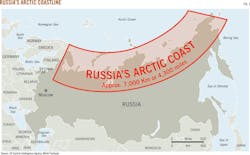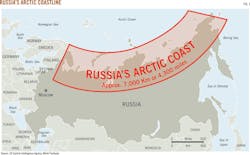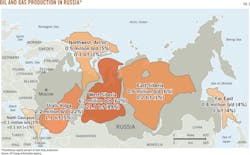Russia sanctions realign Arctic exploration, geopolitics
Tim Reilly
Arctic Advisory Group
London
The latest Western sanctions on Russia's Arctic gas industry, including OAO Gazprom and OAO Novatek, have had a geopolitical impact on the Kremlin. This may lead to closer relations between China and Russia in the region.
It is likely that future Russian Federation responses to these latest gas sanctions will alert Western policy makers to the reality that Russia does not necessarily see the world in terms of a neoliberal order working alongside economics and dominating international discourse.
Secondly, it is unclear if the latest sanctions were intended to be strategic or merely tactical. Nonetheless, the Russian response may well be strategic across the Arctic and of a geopolitical order, possibly affecting regional economics, established alliances, and the governance and globalization of the entire circumpolar north.
Russia's ability to respond within the Arctic is potentially uncontainable. It is difficult to imagine a region of the world where Russia is stronger and where the West would be least minded and capable of confronting its reach. Russia's capability and knowledge of the Arctic are unmatched by any single nation within the Arctic Council (AC)-the regional forum consisting of the eight Arctic states including Canada, Denmark, Finland, Iceland, Norway, Russia, Sweden, and US.
The Arctic is Russia's priority resource base for the 21st Century (Fig. 1). By most evaluations, Russia also is the predominant nation within the Arctic region and lies at the center of impending globalization and global climate change. In addition, Russia's geopolitical status is now strategically vulnerable in the Arctic resulting from ice melt along its 7,500-km northern coastline (Fig. 2).1
To date, Russia's geopolitical concerns have been studiously and perhaps recklessly dismissed by Western policy makers as academically unfashionable, inappropriate in an interconnected globalizing world, and of limited political value in statecraft. For Russia, nothing has been further from the truth.
The deployment of Western forces to the Baltics and Poland perhaps suggests to Russia the intended Western containment in the European Arctic and the eventual undermining of its resource base. The attack on the wider economy through sanctions on Gazprom and Russia's gas industry as a whole may trigger responses that are not politically advantageous to the West.
Western-directed moves in conjunction with economic sanctions may increase the formation of a loosely configured economic alliance between China and Russia in the European Arctic.
Possible outcomes
Politically, Russia may consider the following short-term responses:
• Question the governance of the AC as intellectually incoherent if the North Atlantic Treaty Organization (NATO) is the key instrument in the Arctic.
• Debate the appropriateness of the United Nations Convention on the Law of the Sea (UNCLOS) framework as the AC's sovereign rights emphasis may be replaced by a sovereignty or territorial emphasis under NATO.
• Increase its focus on the US when it assumes the chair of the AC in 2015.
The US's failure to ratify UNCLOS and thus its legal status in voting on any UNCLOS matter including aspects of the new Polar Code, where legislation impinges upon the US Navy's right of Freedom of the Seas and innocent passage in the Arctic, could be exploited by Russia.
Further political embarrassment could be caused with regard to the US's attempt to launch the new Arctic Economic Council that was announced in 2014 to encourage growth of regulated international business in the region. Equally in doubt may be the EU's application to become an observer member of the AC, something it has pursued for years.
Sanctions, governance
In terms of Arctic governance, the AC has proven to be an effective and exceptional international forum where successes have been broad, international, strategically sound, and consistent. The single biggest casualty of a confrontation between Russia and the West in the Arctic could be this essential forum, which in many ways is a model of international cooperation, collaboration, consensus, and compromise when it is needed to achieve equitable results between the region's powerful states.
One of the AC's founding mandates is an agreement to exclude defense matters from formal discussions. The potential incursion of NATO, as now seen by Russia, could logically undermine the AC's purpose and effectiveness.
Russia's alternatives
In terms of immediate response, it is unlikely that Russia will cancel contracts with Western oil companies; there will be delay and review, but neither side wishes to terminate relations.
Moreover, Russia has already identified its weakness in the oil services sector and had begun building capability in that area before sanctions went into effect. Improvements in Russia's service sector were intended not only for domestic use but also to work alongside companies like Rosneft and its Western Arctic partners while participating in joint ventures (JVs) in the West. That vision has not changed.
In the short term, it is more likely that Russia will attempt to augment its reliance on Western companies with Asian suppliers. In time, Western oil companies operating in the Russian Arctic could also be augmented with Chinese oil companies. This is not an ideal solution for Russia or Western oil giants.
Under these circumstances, Western oil services' companies may well look to their continued access to the European Arctic through established relationships and JVs with Chinese operators that have Arctic ambitions coupled with solid Russian relationships. It is conceivable that the oil services industry may take this long-term route back to the Arctic, perhaps as registered Chinese companies. They would likely be welcomed back by Novatek, OAO Rosneft, and OAO Lukoil, as part of an alternative Chinese energy conglomerate. Much will depend on the scale, longevity, and nature of the sanctions.
The potential loss of Western oil companies in the Arctic is ominous for the AC. Environmental protection and sustainable development are the two founding principles of the AC. Paradoxically, oil and gas is one of the few industries with the capital, project experience, and technology to provide the necessary infrastructure for sustainable, environmentally sound development in the Arctic's extreme and hostile conditions.
The importance of this strategy is to implement, monitor, and assess the development of resource extraction in the Arctic to facilitate the safe, secure, and responsible globalization of the region through best-practice policies, risk-management techniques, and vital legislation such as the Polar Code. The question remains as to whether Russia's Arctic exploration industry will adhere to these principles under its own guidance.
Asian dimension
Asia, and China in particular, will perhaps benefit most from this faceoff in the Arctic. For China, working with Russia in the Arctic is economically significant and geopolitically advantageous. For Russia, however, the opposite is true, i.e. geopolitically significant and economically advantageous.
This crucial difference will largely determine how successful any commercially based alliance proceeds. China is a sea power (unlike land-based Russia), and its potential to finance and assist in the development of the Russian-owned Northern Sea Route (NSR) in exchange for unlimited Russian Arctic gas deliveries is attractive. This would also provide access to a new global trade route which is as yet unpatrolled by the US Navy, which is a strategic weakness of China elsewhere in the world where the security of its seaborne trade is effectively beholden to the US Navy. This potential Chinese option is not intended to challenge the US in its own Arctic region however.
Furthermore, while Russia may now view established (Western) globalization of the region through a geopolitical lens and therefore curtail or dismiss Western concepts of regulation, international law, compliance, control, and governance of the Arctic, China will not. China sees the importance of such Western globalizing instruments for its future NSR-facilitated trade with the EU and US as essential economically and as part of wider global trade agreements.
This is not to deny that China has strategic intent in the Arctic, which can be seen in its actions, from producing an operating manual for maritime operators along the NSR, to commissioning the building of research and icebreaker ships, and its growing economic positions held in Iceland and Greenland.
The key observation is that in the Arctic under Western sanctions, China appears to see economic opportunities trumping geopolitical gains. This view is not necessarily shared by Russia; Moscow is also aware of growing Chinese capability in its own Arctic region.
Nonetheless, one way to look at a Sino-Russian Arctic alliance and its unifying vision is that neither China nor Russia views Western exclusion from the globalization of the European Arctic as disastrous-if their alliance can make it work. China perhaps more than Russia, will ponder this opportunity in the European Arctic more carefully.
The key for continued investment in the Russian Arctic is predictability and stability. China will be no different in this, and it is for Russia to demonstrate that it can deliver this kind of investment and operating environment to China, if it wants China's participation, investment, and perhaps political alignment as well in the European Arctic.
Considerations, alliances
Russian President Vladimir Putin's biggest challenge for Arctic development will be to balance domestic factions' demands with international partners' commercial expectations while also gauging Russia's geopolitical ambitions alongside its economic opportunities in the European Arctic.
Western involvement in Arctic globalization may now be negatively affected by sanctions policy, including the ownership, control, and operation of a new global trade route (NSR), linking markets in Asia, EU, and US. One can argue that the NSR is a far more strategic prize than any oil exploitation in the Arctic in the 21st Century; Western sanctions have inadvertently exposed this geopolitical factor and accelerated the race to control this emerging global trade route.
Emerging Russian alliances and responses in the Arctic will become evident over time. The US's chair of the AC in 2015 and Russia's response to this leadership will reveal wider Russian intent.
Indispensable Arctic actor
Russia's role in the Arctic runs the gamut from environmental protection and climate research to energy exploration and regional cooperation, e.g., Barents regional cooperation.
Russia's science, technology, infrastructure, geographical location, and national resources are collaboratively employed in myriad Arctic societal and environmental projects and circumpolar economic undertakings that benefit the indigenous peoples of the Polar North, as well as powerful nations inside and outside the Arctic, with their own polar interests.
The West may have underestimated the extent of the fallout of sanctions directed at the Arctic as the longer-term consequences for the West are far more international, complex, and strategic. The biggest potential casualty is the efficacy and utility of the AC's successful governance of the entire circumpolar north; conversely, the biggest beneficiary could be China.
A way forward
It is worth mentioning in this context that the AC was explicitly created to reduce geopolitical tensions in the Arctic, to decide issues by consensus, to encourage cooperation and collaboration between Arctic nations, and to provide a means for Arctic countries to employ compromise as necessary.
Is it conceivable therefore that a twin tracked approach be considered with regard to Russia and Western relations, whereby crucial bilateral and intergovernmental talks continue between the EU, US, and Russia over the crisis in Ukraine.
Meanwhile, the AC, as the key regional forum, conducts strictly confined talks on the economics, mechanics, longevity, and possible reversability of (some) Arctic sanctions?
Reference
1. Mackinder, H.J., "The Geographical Pivot of History," The Geographical Journal, Vol. 23, No. 4, April 1904.
The author
Tim Reilly ([email protected]) is founder cochairman of Arctic Advisory Group, London. Tim has also served as Royal Dutch Shell PLC's government affairs advisor in the Caspian region. He has held similar positions with Chevron Corp. and JKX Oil & Gas PLC. His PhD work on Arctic oil and gas was at the Scott Polar Research Institute at the University of Cambridge, UK. He is senior fellow and resident Arctic expert at the Institute for Statecraft in London.


